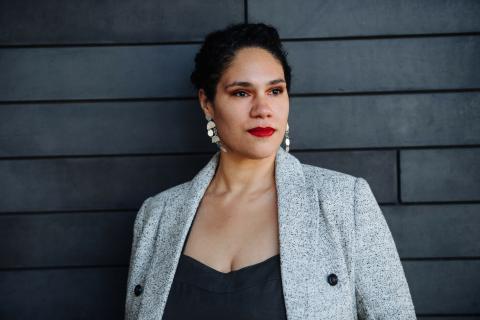You are here
Meeting Oppression With Music
Jessie Montgomery, composer, violinist, and educator, was born December 8, 1981, in Manhattan’s Lower East Side to artistic parents. Her mother, award-winning playwright Robbie McCauley, wrote traditional and experimental plays addressing race throughout the 1970s and into the 2010s before her death in 2021. Her father, Edward Montgomery, ran a studio for myriad artistic styles and practiced with her every day.
She attended Juilliard and received her bachelor’s degree in violin performance, later obtaining a master’s degree from New York University in Composition for Film and Multimedia, and was a graduate fellow in music composition at Princeton University.
Montgomery has long been involved with The Sphinx Organization, a Detroit-based non-profit dedicated to serving Black and Latino communities by supporting their artistic endeavors in under-resourced areas. After being awarded the Sphinx’s highest honor, the Medal of Excellence, and composing multiple commissioned works, she works as composer-in-residence for the organization.
Her accolades also include the Leonard Bernstein Award from the ASCAP Foundation and a 2024 Grammy win for Best Contemporary Classical Composition with Rounds. In July 2021, she began a three-year appointment as the Mead Composer-In-Residence with the Chicago Symphony Orchestra. Montgomery was recently appointed to the Bienen School of Music faculty, where she now shares her expertise as a lecturer in Composition and Music Technology.
From Montgomery’s own words:
"Soul Force is a one-movement symphonic work which attempts to portray the notion of a voice that struggles to be heard beyond the shackles of oppression. The music takes on the form of a march which begins with a single voice and gains mass as it rises to a triumphant goal. Drawing on elements of popular African-American musical styles such as big-band jazz, funk, hip-hop, and R+B, the piece pays homage to the cultural contributions, the many voices, which have risen against aggressive forces to create an indispensable cultural place. I have drawn the work’s title from Dr. Martin Luther King’s 'I Have a Dream' speech in which he states: 'We must not allow our creative protest to degenerate into physical violence. Again and again, we must rise to the majestic heights of meeting physical force with soul force.'"
